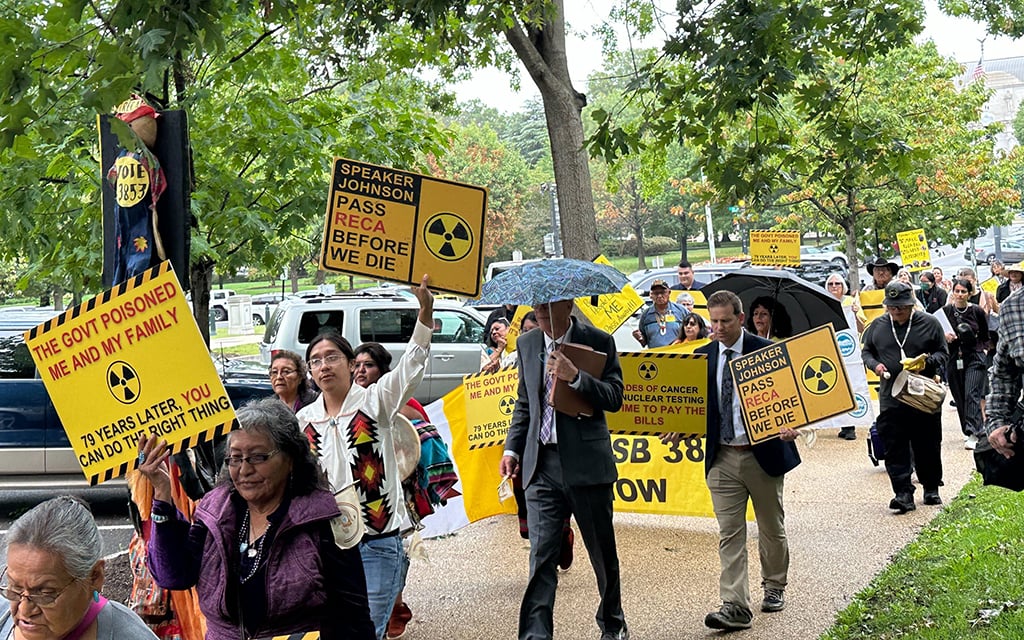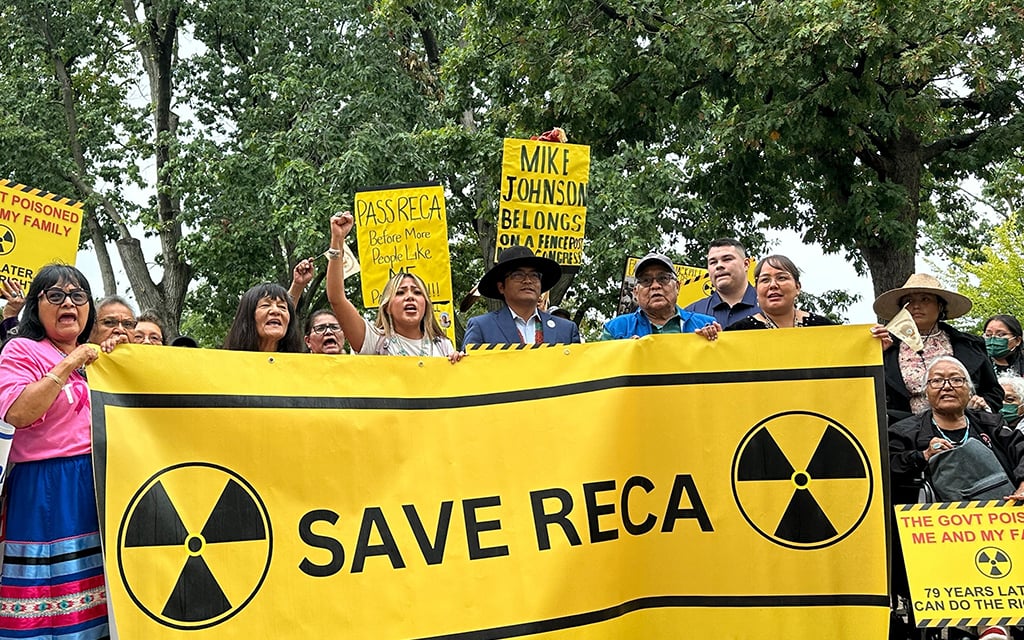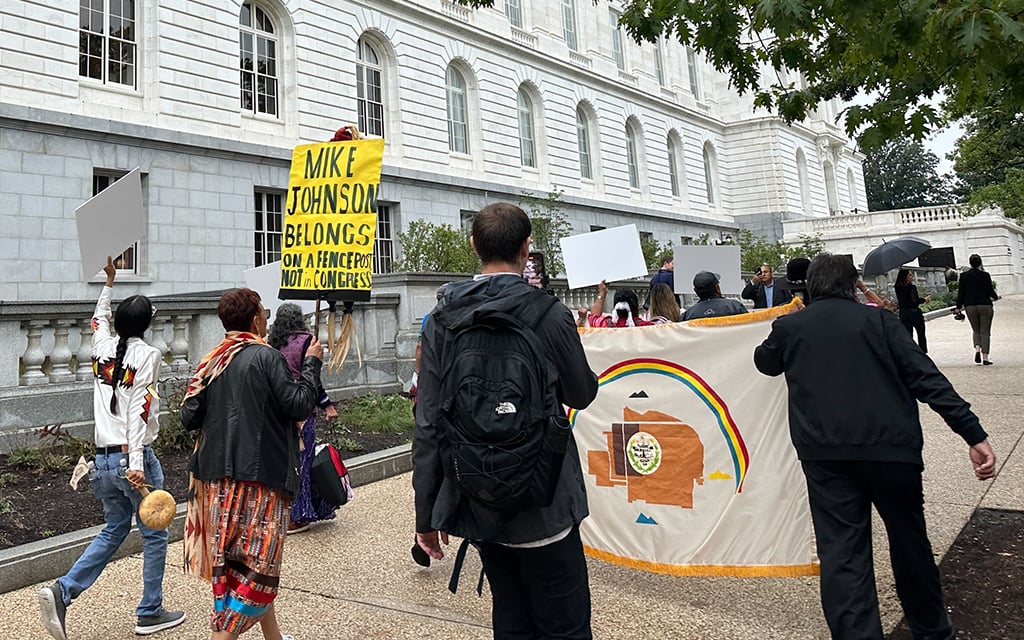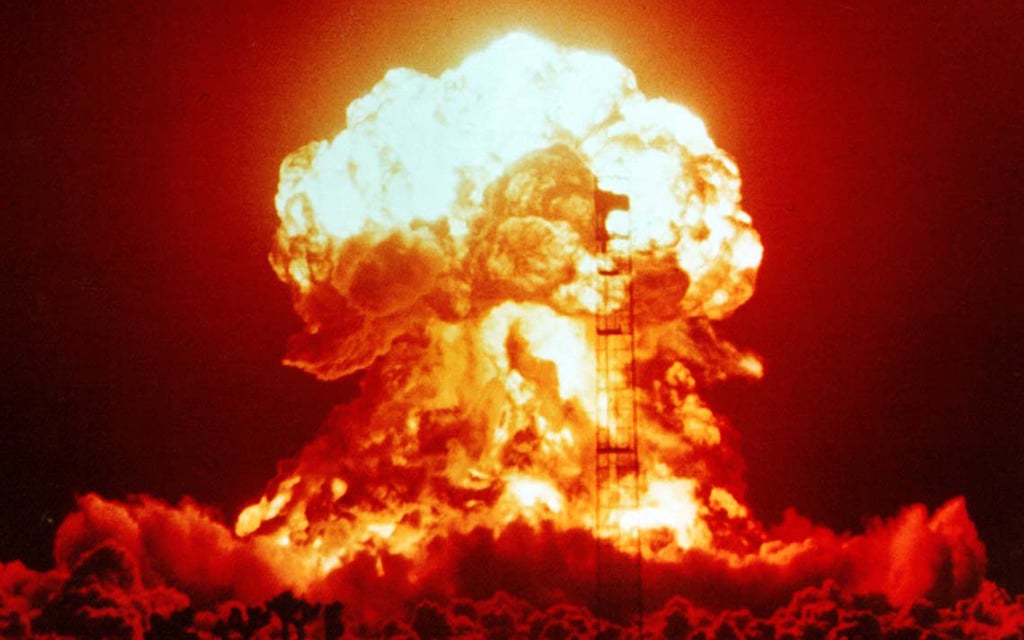WASHINGTON – People exposed to radiation from atomic bomb tests and uranium mines rallied Tuesday at the U.S. Capitol – along with tribal leaders – to demand action on a stalled compensation program.
“They gave the ultimate sacrifice when it was needed. We should reward the people who didn’t question what needs to be done,” said Navajo Nation President Buu Nygren.
Much of the frustration was aimed at House Speaker Mike Johnson, who has not said whether or when he will put the Radiation Exposure Compensation Reauthorization Act to a vote.
Congress approved the original program in 1990 and has extended it several times. The last extension expired in June.
RECA, as it’s widely known, provided payments to people in 12 states who’d been affected by nuclear fallout or who worked at uranium mines and mills before 1971 – that is, during World War II and through much of the Cold War.
“Downwinders” from the Nevada nuclear test site were eligible for $50,000. Uranium workers, many of them Navajo, were eligible for $100,000.

Nuclear fallout and radiation from uranium mines have plagued tribal communities since before the Cold War. Protesters call for action Sept. 24, 2024, in Washington to reactivate a federal compensation program. (Photo by Gabrielle Wallace/Cronkite News)
“Please, Speaker Johnson have that compassion in your heart,” said Kathleen Tsosie from Cove, Arizona, who has been lobbying on the issue since 1998.
Phil Harrison, a Navajo member and former uranium worker, said no one ever disclosed the dangers. He developed kidney failure in 1999, at age 49.
“I’d like to ask Speaker Johnson to pass this RECA. As a leader, he has that responsibility,” Harrison said.
The Navajo Nation has a long history of exposure from nuclear fallout and the uranium mines.
There are roughly 500 abandoned uranium mines on Navajo lands. Many workers were not well versed in English, and the hazards were not properly communicated. Many brought their families to live with them near the mines; their cancer rates are also elevated.
Some House Republicans have expressed cost concerns. A GOP leadership aide said the version approved earlier this year by the Senate would massively increase federal spending.
The Senate bill, approved on a bipartisan 69-30 vote, not only reauthorizes RECA but expands it to cover more parts of the Western states and more illnesses. It also adds exposure to nuclear waste dump sites and expands eligibility to people who worked in the mines through 1990.
“We’ve heard from Mike Johnson’s office that they’re worried about the cost, and I think that is very disingenuous,” said Lilly Adams, a senior outreach coordinator of the global security program of the Union of Concerned Scientists.
When RECA was adopted, it was seen as a cheaper alternative to litigation involving tens of thousands of cancer victims who didn’t get sufficient warnings about radiation hazards.
The Speaker of the Navajo Nation, Crystalyne Curley, said many of her own relatives died from radiation-related illnesses, including a grandfather who worked in the uranium mines.
She said she understands cost concerns that Johnson and his caucus might be wrestling with. But she said, “You can’t put a price on a life, especially if they have been mistreated.”
The demonstration Tuesday marked the start of a three-day push to pressure the House into voting. Starting at the Navajo Nation Washington Office, a group of more than 60 people walked several blocks to the Capitol in the rain.
They chanted “Pass RECA now” and held signs with the symbol for radiation hazard. One sign read, “The govt poisoned me and my family. 79 years later, you can do the right thing.”
Nygren, the Navajo Nation president, held a sign that read, “Decades of cancer from nuclear testing. It’s time to pay the bills.”
After a news conference, the group moved outside to receive blessings from the DinéTah, a Navajo dancing group.
Since the end of 2023, RECA has received 7,890 claims from members of tribal nations, 86% of them Navajo.

Navajo Nation Speaker Crystalyne Curley, far right, behind sign, and President Buu Nygren, center, in hat, march to the U.S. Capitol on Sept. 24, 2024. They and others were calling on the House to renew an expired compensation program for victims of nuclear bomb tests and uranium mining. (Photo by Gabrielle Wallace/Cronkite News)
Downwinder counties in Arizona include Apache, Coconino, Gila, Navajo and Yavapai. The Senate bill would add Mohave County.
At the news conference, lawmakers from both parties voiced support for RECA or vented at Johnson’s inaction.
Sen. Josh Hawley, a Missouri Republican, said RECA advocates represent both the suffering and heroism of Americans.
“Speaker Johnson is the only reason these people are suffering right now and he can fix it,” said Dawn Chapman, founder of Just Moms STL, which is fighting a nuclear waste site near St. Louis, Missouri. “He needs to move and he needs to move today.”
The three Arizona Democrats in the House, Reps. Raúl Grijalva of Tucson and Greg Stanton and Ruben Gallego of Phoenix, wrote to Johnson in June demanding a RECA vote.
“It’s unacceptable that, because of extremists in Congress refusing to act, hundreds of Arizonans are going without the care and compensation they deserve after sacrificing their health for our national security,” Gallego said in a statement.
Millie Chino of the Laguna Pueblo tribal nation in New Mexico held a framed photo of herself and her husband, James Chino, during the march to the Capitol. He died a year ago after being diagnosed with three different types of cancer starting in 2010, she said.
The RECA claim he later filed was denied because he did not work in the mines long enough.
Chino said she joined the protest to “budge anyone’s heart to do something right.”
At the news conference, Sen. Martin Heinrich of New Mexico, a Democrat, predicted that if Johnson did put RECA reauthorization on the House floor, it would certainly pass. Others agreed.
“I hope I run into him. Maybe I can talk some sense into him,” said Elvina Billiman Carl, from Buell Park, Arizona.




